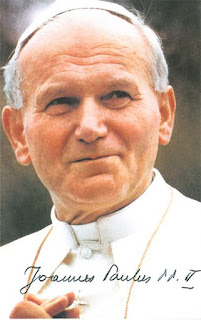 |
Pope Saint John Paul II. the Great
(Saint Karol Józef Wojtyła)
/1920-2005/
Photo credit:
|
(PL) „Człowiek zostaje potraktowany jako narzędzie produkcja, podczas gdy powinien on – on jeden, bez względu na to, jaką pracę wypełnia – być traktowany jako jej sprawczy podmiot, a więc właściwy sprawca i twórca.”
(HU) „Az emberrel úgy bánnak, mint puszta termelőeszközzel, holott tekintet nélkül a munka fajtájára, úgy kell vele bánni – és egyedül ővele – mint a munka cselekvő alanyával, alkotóval és mesterrel.”
(LAT) „Homine ut mero instrumento utuntur ad bona gignenda, cum utendum sit eo – eoque solo – nulla habita ratione operis, quod facit, ut subiecto efficiente laborem eiusque vero artifice ac magistro.”
(EN) “Man is treated as an instrument of production, whereas he – he alone, independently of the work he does – ought to be treated as the effective subject of work and its true maker and creator.”
(IT) „L’uomo viene trattato come uno strumento di produzione, mentre egli - egli solo, indipendentemente dal lavoro che compie - dovrebbe essere trattato come suo soggetto efficiente e suo vero artefice e creatore”
(DE) „Der Mensch wird als bloßes Werkzeug behandelt, während er - um seiner selbst willen, unabhängig von der Arbeit, die er tut - als deren verursachendes Subjekt, als deren wahrer Gestalter und Schöpfer behandelt werden sollte.”
(FR) „L’homme est alors traité comme un instrument de production 12 alors que lui - lui seul, quel que soit le travail qu'il accomplit - devrait être traité comme son sujet efficient, son véritable artisan et son créateur.”
(ES) „El hombre es considerado como un instrumento de producción, mientras él, — él solo, independientemente del trabajo que realiza — debería ser tratado como sujeto eficiente y su verdadero artífice y creador.”
(PT) „O homem passa então a ser tratado como instrumento de produção; enquanto que ele — ele só por si, independentemente do trabalho que realiza — deveria ser tratado como seu sujeito eficiente, como seu verdadeiro artífice e criador.”
(SK) „Človekom sa zaobchádza ako s výrobným nástrojom, zatiaľ čo s ním - s ním jediným - bez ohľadu na to, akú prácu vykonáva, sa má zaobchádzať ako s tvorivým subjektom a jej pravým strojcom a tvorcom.”
(Laborem exercens, Castel Gandolfo, 14. 09. 1981. 09. 14.)




